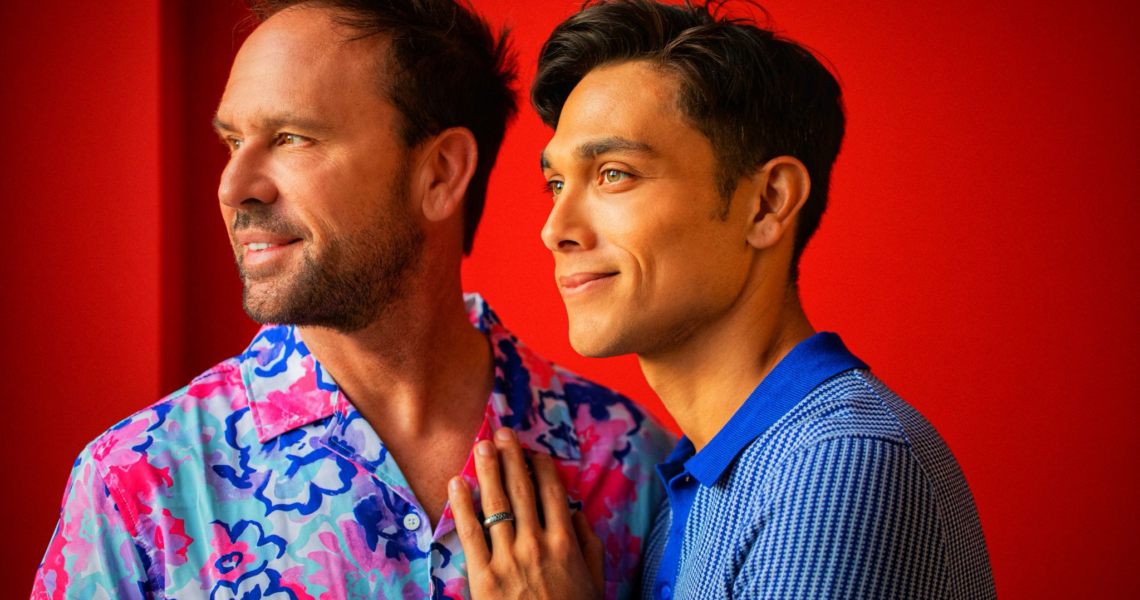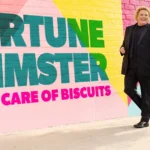As Pride season continues with festivals, parades, and increased nightlife, there is a community within our LGBTQ+ family that continues to thrive and grow, gaining a stronger voice in the last decade – that of our sober community. Pride celebrations now include safe spaces and events that cater to those on their journey from addiction, the stigma towards our sober family and the assumption that they can’t party with us is being diminished. Yet, there is still a long way to go. Because of our battle with discrimination, isolation, gender identity, and abandonment, the LGBTQ community struggles with substance abuse at a rate of two to three times that of the general population. Alarmingly, up until now, there have been zero facilities dedicated to our particular needs. Enter Rainbow Hill, founded by Southern California-based couple Andrew Fox and Joey Bachrach. The two, inspired by their own journey in recovery, left lucrative careers in real estate to open the doors of Rainbow Hill Sober Living in 2021, and, this summer, Rainbow Hill Recovery, an intensive outpatient treatment center in the Los Angeles area.
With addiction rates so high, why do they think it has taken so long to establish facilities specific to our community?
Joey: From what we’ve gathered is that there’s a lot of fear with having a specific community for programming and for housing because of the clients and being afraid of not being able to fill them. Or they think about finances more than they do about the people. I can’t speak for other programs, but for us, we’re in a position where we’re able to do that and take that risk and make a difference. So that’s something that Andrew and I haven’t wavered on, which is really neat.
Andrew: I got sober almost 14 years ago and I did not want to go to sober living, I wanted to be around my peers and just feel very comfortable. I did it on my own. Maybe that was the fear that got me sober. But we both wanted to design a place that we both would want to stay at. It shouldn’t be a doom and gloom – a dark gray house with closed-off curtains. We want it to be bright and happy, and a place for people to feel free to be who they are so that they can work on their sobriety.
There has been a bigger presence and visibility of the sober community at our Pride celebrations. Do they think the stigma of being sober and LGBTQ is diminishing?
Joey: 100 %.! There are so many cool hashtags: #soberissexy #soberAF #soberisthenewcool. It’s who we are as individuals, but it’s also a movement. It’s something that people now wear on their sleeves. I know that I’m a proud alcoholic, and I’ve been very vocal about who I am, my struggles, where I am today, and how I got to where I am today, to hopefully be a beacon of hope for people who are in our home and in our program. I love being sober and I’m an open book.
Andrew: And we do like spreading that message that sobriety takes courage and it’s cool. It’s a really whole different level of self-discipline and learning about yourself as well. I do think it is a movement where people are starting to stand up and talk about it more. And then when you see a celebrity that’s sober and you had no idea, you’re like, wait a minute. What impressed me when I was out drinking and would be with a friend that didn’t have a drink at all that entire night was like, that is really cool that that person was hanging out, socializing with us, didn’t feel uncomfortable, and didn’t need to be drunk. I think it’s great that a lot of people are starting to talk about it.
Joey: What’s really cool is that with a lot of LGBTQ sober celebrities, it shows that addiction affects everybody, all walks of life. It doesn’t matter whether or not you’re homeless or if you’re a celebrity that everybody recognizes from the street, the beautiful thing is that it doesn’t discriminate, and it’s something that people can relate to one another. I find that rather beautiful.
The couple would meet when they paired up for a real estate agent’s broker preview. Soon after they would start to hang out and discover their shared interest and their shared recovery path. Andrew was newly sober, with just a few months in, and Joey with more than a decade in recovery. After Andrew played hard to get for a bit, they eventually went from best friends to dating to getting married. And though they are currently on the same recovery journey, their fall to addiction was very different.
Joey: I would put myself in very questionable situations where I have been sexually harassed and assaulted. And it’s something that has taken a lot of time and a lot of therapy to speak openly about. I did not like who I was, and I had three different versions of myself. I had Hoe-y who was a whore. I had Jose who was a completely despicable human being. And then Joey, who you’re interviewing today. But knowing that those versions of myself are dormant and not dead has been something that keeps me in check day in and day out, which is kind of neat. It was going to be my downfall and I probably would’ve died, to be completely transparent with you.
Andrew: I was a functioning alcoholic for many years and it wasn’t until a series of events in my life that weren’t going my way. I had first-time deaths in my family that I had never dealt with before. Just some really hard times, all bundled together to where I tipped over and just could not stop drinking. And it was a depression along with that. I was literally at the bottom of a pit not knowing what to do. And seeing just the pain in my family’s eyes and seeing the depression. It’s a family disease. It was my grandfather and my father, and it just took one thing for my mom to turn that light bulb on for me., “You need to be the one to break the pattern. You’ve got to change it.” So, I took that very seriously, since that day, I’ve never relapsed. I just wanted to restart my life from the bottom up, rebuild my foundation, rebuild myself, restructure, rethink everything, and go to therapy. It’s changed my life and it’s changed my way of thinking, and it just has really helped me kind of not use an excuse with alcohol to get through and to do things. It’s been very rewarding to be able to stand up and speak and not need a drink before. It taught me a lot about myself and my strengths.
An unfortunate part of recovery can include relapse, something Joey does not shy away from talking about.
Joey: I did relapse; relapse is part of my story. It’s not a stepping stone, and we make sure that all of our residents know that it’s not a part of sobriety for everybody, and it’s not required. But for me, I thought that after I had a year and some change under my belt, I was unique, special, and different – and maybe not an alcoholic. I made the decision in my head mentally that after I get a year, I’m going to start drinking again. But I used my father’s passing on the anniversary of his day when he died as an excuse to drink. But it took me seven more months to get back and put my head back on and realize, no, no, no, it wasn’t because my father passed away on that day, it was because I made the decision to start drinking again. So I understood that I’m somebody who’s incapable of drinking, and that’s okay. That’s when it really clicked for me. And now I’ll have six years in November.
Do they have any advice for someone dealing with a loved one that is going through recovery and might not be doing well?
Joey: Relapse has unfortunately happened not in the house, but it has happened with residents who were former clients of ours. And the number one question and concern that comes up with the current residents is, what could I have done to make sure that they didn’t do that? How could I have prevented it? Every time somebody moves into the house, Andrew and I have a conversation with them, and we let them know, listen, it is their decision. They are the ones that go out. You should never give any power to a person, place, thing, or feeling to be the reason why you go out. And from personal experience, I was able to share that I went out because I wanted to, but I made all these other excuses. And the only way that I’m able to be there for that person is when they are ready to come back, letting them know that they have a safe place to call home. And also setting a healthy boundary between you and that individual saying, these are my boundaries, and these are the ones that I can’t have disrespected or crossed. Because your sobriety is ultimately the most important.
Andrew: If it’s with a loved one, a partner, or a family member, you just have got to tell yourself that love will always win. So you can love this person in your life that has an addiction problem, but you have to be careful not to enable it. Enabling is also like a drug. It starts off great, you could really pull someone out right away. You could help them, you could get them on their feet, but the more you do it, the more tolerance is built up. And then before you know it, you are carrying somebody and they are getting worse and worse and worse. You just have to trust that if you go back to love – I love this person – I love them enough to know that I need to maybe keep an eye on them, but not help them, let them reach it, keep an eye on them, but don’t help the process go any further.
It’s a very difficult place to be in a lot of times. You need to ask for other help and advice on this situation, but I see it happening all the time with parents and their children, it’s hard. As a parent, you just want to protect your child their entire life, and you don’t want them to die. But a lot of times it almost makes the situation worse. The sooner you can cut that off, love will win and they will come back to you and you did it because you love them.
I got tough love. My mom said, “You know what? I’m done. I’m changing my locks. I’m not talking to you. You’re out of my life.” And it really freaked me out. It’s different for certain people and what level they’re at and if it’s mental health maybe be a little different. It is different and harder with mental illness as well, but it is just important for everyone to get their help. You can help guide them – you have got to go see a doctor, you have got to get diagnosed, let’s get you there. Even if they’re being awful and terrible towards you if they are on a down cycle, but then you leave it there, let the professionals deal with it, and don’t encourage the non-medicated or silver lining. Yeah. It’s a tough situation as a friend to be in as well.
In June, the couple opened the doors of Rainbow Hill Recovery for anyone from the LGBTQ+ community offering a range of services, including individual therapy and groups as well as EMDR, brain spotting, and other trauma-informed modalities with intensive outpatient, outpatient, partial hospitalization, and aftercare programs. The center is changing the standards in the industry, even beyond the LGBTQ community.
Joey: We have a fantastic powerhouse of a clinical director named Betsy Spier, who has been in this field for 30-plus years and has invaluable experience. And one thing that she’s extremely proud to be bringing to our program is experiential therapy. We have individualized therapy, we have group therapy, art therapy, EMDR, Reiki, Reiki sound bath healing, and more.
Andrew: They’re learning how to get outside of their head and just really learn how to express themselves through art. It helps the thought process get out on paper and really works well that way. It’s a new outlet, and they suddenly are putting their phones down, and they’re not scrolling through social media 24/7.
Joey: Also something that’s cool about our space is that each office is different. We brought our aesthetic from the sober living house, but we toned it down and made it a little bit more professional. But each room is a different color, and it’s the color of the rainbow, row by row. And then we have the trans colors for the group rooms and the art rooms, which is amazing. We wanted to bring a lot of color into it.
And the future of Rainbow Hill?
Joey: We really need to open a house that is specifically tailored to trans women. Finding affirming homes is already difficult enough, but to find affirming homes that are specialized and specifically for trans women, there’re none out there. So that’s our next goal. As far as the big idea – do go national and have a Rainbow Hill recovery in states where being who you are is looked down upon, and they can go there and focus on the recovery. You don’t have to explain who you are, which is unique and special.
We’re working to get in-network contracts. Andrew and I got into this field specifically knowing that we weren’t going to be the wealthiest. That was never the goal, but we do want to be one of the most successful, which means longevity and making it affordable for people. It’s going to be at an affordable cost and rate, which it should be.
And their message to the community?
Joey: If you are struggling with addiction and you need a place to call home, we are a phone call away.
Andrew: You do matter and we support you. Don’t give up, keep going. Don’t listen to the outside chatter. Focus on your own life and whatever the government’s telling you, tune it out. Keep going. Find your tribe and stay strong.
For more information, head to http://www.rainbowhillrecovery.com/
Last modified: September 6, 2023



















